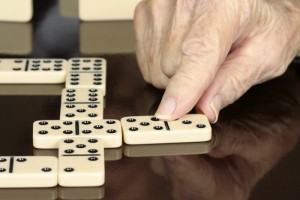Posted on August 4, 2015 by Robyn Tellefsen
There’s no shortage of brain games for seniors, particularly online. Reputable organizations like AARP offer free online brain games so you can have fun testing your memory, attention, and language skills. Word games are designed to help you improve your vocabulary, crossword puzzles are geared toward enhancing your problem-solving abilities, and shape and color games aim to boost your concentration.
However, when I checked in with Dennis Fortier of Brain Today, which distills the daily news about brain health to help people distinguish between meaningful science and commercial hype, he was not entirely optimistic about the use of games to boost brain power.
“While there is pretty strong evidence that an active brain is more likely to remain healthy than an idle brain, most if not all of that evidence is based on lifelong learning activities, not game playing,” he points out. “In other words, not all brain activities are equal.”
Here, the president and CEO of Medical Care Corporation, a neuroinformatics company in California, offers his insight into the benefits of brain games for seniors.
Rethinking Brain Games
“Learning and incorporating new information seems to be the activity that results in robust brain circuitry,” says Fortier. “Unfortunately, the challenges presented in most games do not require that the game player learn new information and incorporate it regularly.”
While game players tend to get better at the games themselves (e.g., pattern recognition, memorization, calculation, word generation, word association), he says, studies have shown that gamers demonstrate no measurable improvements in cognition in real life.
On the other hand, Fortier notes that gaming in groups could offer significant cognitive benefits.
“One of the best cognitive workouts is cultivating relationships with new people,” says Fortier. “To the extent that games are played in groups among individual players who must cooperate on teams with other players they don’t know well, then game playing might show the benefits of learning about new people and incorporating that knowledge as part of game strategy.”
So, rather than sitting solo in front of a computer screen, consider inviting others to join you in your game play.
The Best Brain Games for Seniors
Of course, brain games are no substitute for heart-pumping physical activity.
“The evidence supporting the brain health benefits of regular physical exercise is very strong, so it would be best if seniors do not allow time spent gaming to cut into their daily walk, their gardening, their swim, or their shuffleboard,” says Fortier.
He admits that upgrading from a mindless activity to a challenging game could be beneficial, but seniors who are already physically and mentally active should not forgo those activities in favor of gaming.
“If a rich learning exercise like language study, practicing a musical instrument, or cultivating a complex hobby is replaced with gaming, the effect might be detrimental,” he says.
The Bottom Line on Brain Games
While Fortier is in favor of seniors keeping their brains active, he does not want to mislead people into thinking that brain games are the absolute best brain health strategy.
“Scientific evidence hasn’t yet been produced to support the hypothesis that gaming can make you smarter,” he says. “As such, it is too early to claim that gaming is a path to a better brain, but it is also too early to claim that it is not.”
Are you a fan of “brain games”? If so, which ones, and what do you feel you get out of them?
Robyn Tellefsen is a New York City-based freelance writer, editor, and blogger whose work has appeared on MSN, AOL Jobs, Chase, Parent Society, The CollegeBound Network, and others. She is also a freelance copy editor and proofreader for textbook publishers, educational technology companies, advertising agencies, and individual authors. Robyn has a bachelor’s degree in communications from Wheaton College (IL).



